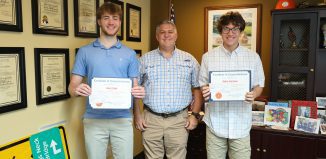Chronic nurse shortage at Northport VA raises red flags
Feds recommend trio of changes in staffing, hiring and overtime management to facility’s new leadership
A federal investigation into Northport Veterans Affairs Medical Center’s four community living centers has shown a troubling trend of chronic nursing staff shortages and excessive overtime, issues that could have placed patients “at a higher risk for adverse events.”
In one case, federal investigators found a nurse’s assistant worked double shifts for six straight days — more than 96 hours in a single week – while expected to diligently oversee a patient requiring one-on-one care.
As the Northport facility is the only VA Medical Center on Long Island it serves more than 31,000 patients per year and oversees several outpatient clinical sites. Its four nursing homes are located in two buildings, with an approximate capacity of 170 beds.
The Office of Inspector General, a division of U.S. Department of Health & Human Services, charged with independent oversight of Department of Veterans Affairs programs, received several anonymous complaints about the quality of care received at Northport VAMC in 2017 following the deaths of two patients.
In September 2017, the OIG launched a year-long investigation into staffing shortages after receiving two further emails: the first from an employee at Northport VAMC, the second from a liaison to the House Committee on Veterans’ Affairs. The investigation produced a Sept. 18 report (click here to read the full report) that found Northport VAMC’s leadership knew about the staff shortages, forced administrative level nurses to care for patients, and yet still continued to accept new patients despite knowing they wouldn’t have the staff needed to provide the expected level of care.
Federal investigators recognized in August 2017 there was significant turnover in the leadership at the Northport VAMC, affecting key positions such as its director, acting chief of staff and acting nurse executive, who were cited “as catalysts for this change.” Staff members’ remarks indicated it’s given them hope for a better future.
The agency recommended a series of changes for the Northport VAMC pertaining to the nursing staff currently being enacted, and the facility says is bringing immediate tangible results.
Two patient deaths
Anonymous complaints about two patient deaths at the Northport VAMC in 2017 started the series of federal investigations into the facility.
The first death was a male patient in his late 60s who died as a result of choking on his food. Federal inspectors found insufficient evidence the man’s death was due to a lack of nurse oversight, as alleged in the complaints, but did conclude Northport VAMC had ongoing challenges in maintaining basic necessary staffing levels.
“Conditions such as staffing shortages could create an environment where the increased workload assigned to each staff member was such that it became more difficult to remain vigilant,” the report reads.
A forum was held for the Northport VA nursing homes staff to voice their concerns with the facility and its operation while an investigation of the first patient’s death was ongoing.
“Many [staff members] shared a concern about staffing levels being too low,” the report reads.
A second death raised claims of poor quality of care in the Northport vets nursing homes, after a patient in his mid-60s slipped, fell and fractured his hip. He underwent surgery and six days later stopped breathing. Allegations included the VA staff failed to protect the patient from falling and failed to properly provide
one-on-one observation post surgery, neither of which was substantiated by federal investigators.
The investigation into the second death showed the nurse’s assistant caring for him was on her sixth consecutive day of double shifts — 16 hours at a stretch. Investigators again cited “concern that working extra hours with double shifts could lead to staff becoming tired and less vigilant.”
A staff member working double shifts was not common practice, according to Northport VAMC spokesman Levi Spellman, who said union workers are contractually required to have 10 to 12 hours off between nursing shifts.
Closer look at staffing numbers
Records pulled by the federal investigators showed Northport VAMC has been chronically short of nursing staff dating back to at least 2016. Allegations were made that understaffing could lead to a higher rate of “nurse-sensitive outcomes,” such as surgical wounds getting infected, urinary tract infections, ulcers and pneumonia.
Northport’s four nursing homes were found to be short approximately 6.3 full-time employees in 2016 needed to meet VA’s recommended number of nursing hours spent with patients per day. By 2017, the facility’s staffing shortage had more than doubled, with 15.3 additional full-time employees needed. Northport VAMC’s nursing homes were only staffed at 60 to 80 percent of recommended levels over the two years, according to federal investigators.
Northport VAMC’s leadership attempted to tackle the short staffing issue by using “floating” shifts and overtime — sometimes mandatory, according to the federal report. Floating shifts meant staff from other areas of the VAMC were brought in to assist with patients in the nursing homes.
In 2016, Northport VAMC’s nursing home employees put in a total of 19,991 hours of overtime. It nearly doubled by the end of 2017 as only 107.9 of the facility’s authorized 128 full-time positions were filled, according to Spellman, causing the facility’s overtime costs to skyrocket to nearly $1.5 million.
“Nurse managers had no mechanism to alert them if one of their unit nursing personnel worked excessive OT,” the report reads.
Federal investigators found part of the nursing homes’ staffing issues were due to an inability to hire and retain the members of its nursing staff. Northport VAMC got approval to hire 10 additional registered nurses and 10 nurse assistants as intermittent staff in November 2016, though the team wasn’t assembled until August 2017.
Often the process of hiring new nursing staff was delayed. In one instance, Northport’s leadership said two applicants interviewed and hired in January 2017 were told they would not start working until July.
“This delay in hiring often resulted in the loss of selected applicants who took other jobs,” the report reads.
The leadership of Northport VAMC said the high cost of living on Long Island has also made finding and maintaining a full-time staff difficult.
“Not only does this affect our ability to retain talent, but to recruit it as well,” spokesman Spellman said.
Steps to improvement
The federal investigators made three recommendations to Northport VAMC in order to ensure it has adequate nursing care for its patients and improve quality of care for residents.
First, that the VAMC’s acting director, Dr. Cathy Cruise, completes a review of the nursing homes to ensure staffing levels align with the needs of its current residents. More staff should be recruited and hired to fill the current vacancies “until optimal staffing is attained,” reads the report.
Spellman said leadership of Northport VAMC, including Cruise, have already started taking action, implementing changes to improve the quality of care and working conditions.
A registered nurse clinical coordination position has been added in order to streamline nursing staff’s efficiency, according to Spellman. At the beginning of 2018, the facility was given approval to hire 2.6 more full-time employees and another 10 staff members were recently approved to bring the total nursing staff to the equivalent 140.6 positions.
“A staffing methodology is in the process of being completed, with additional staff expected,” Spellman said.
The Northport VA has received approval to directly hire its nursing staff and is giving new employees immediate start dates, according to him. It also had plans to expand its nursing floating pool, and to cross train other VAMC nurses in long-term care to continue to grow the available number of staff who can provide residents with care.
Third, Northport’s leadership was also told to improve its management of staff’s overtime hours and make sure of future responsible use of financial resources, citing the $1.5 million in 2017 overtime.
“Federal employees are expected to be good stewards of government funds,” the report reads. “The OIG found a lack of accountability for managing OT expenditures.”
Spellman said the nursing homes staff had a total weekly average of 437.3 hours of overtime for the 2018 fiscal year, which ended Sept. 30. This indicates a significant drop from last year, where the total weekly average of overtime exceeded 750 hours.
“All of this is to say that, while the OIG has helped Northport identify areas in which we can improve, we have implemented measures to make those improvements — and we are already seeing results,” Spellman said.







